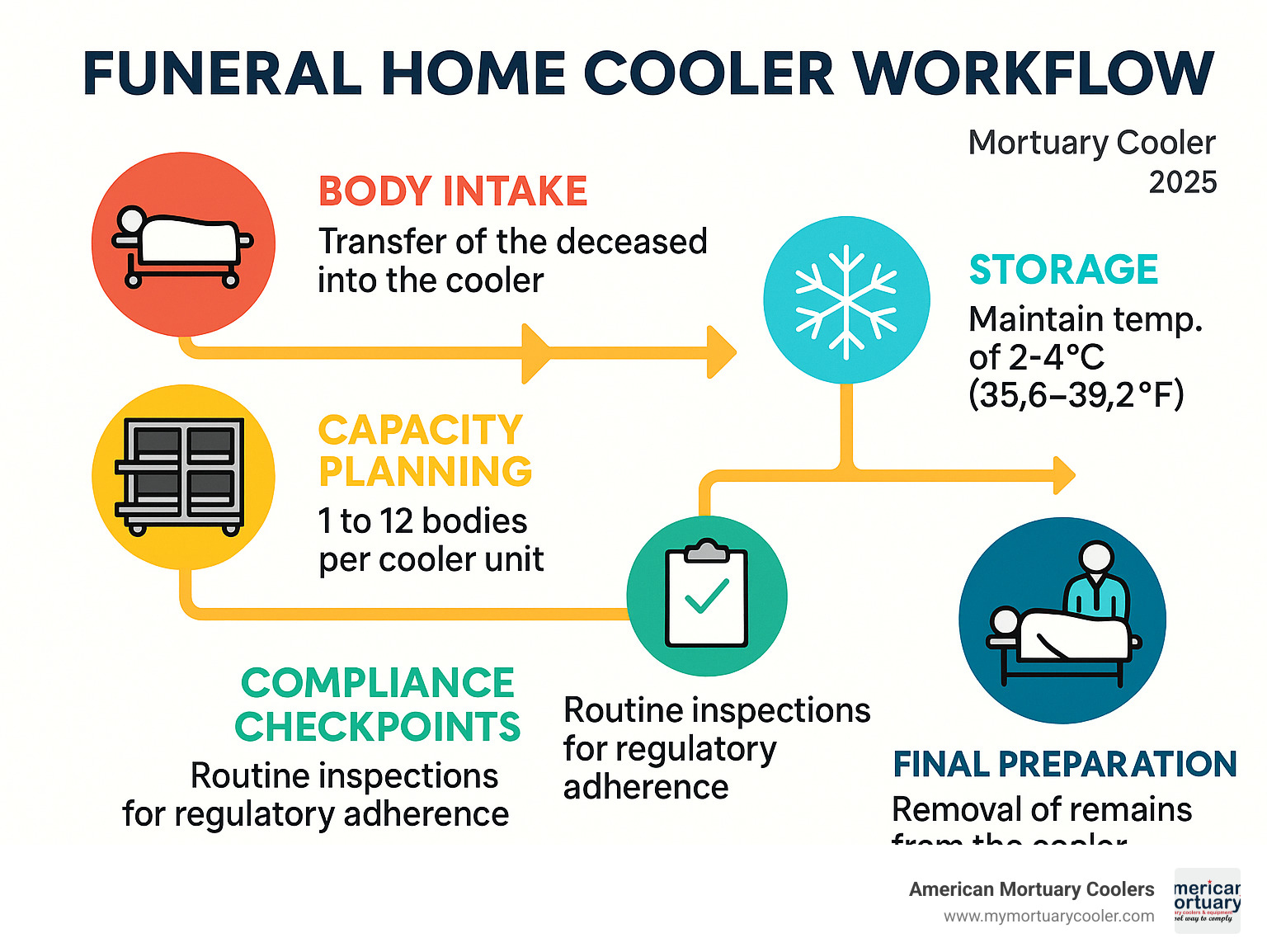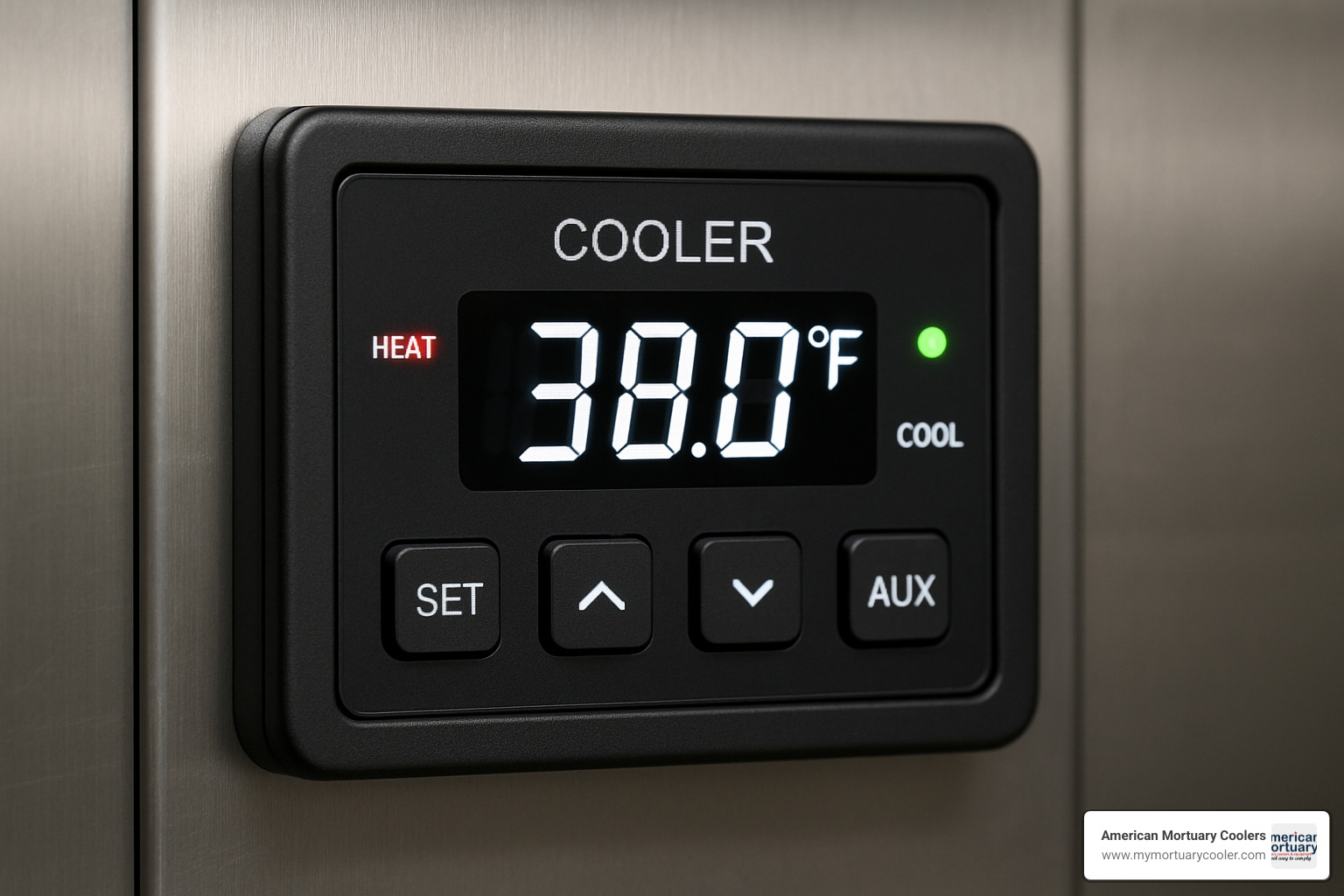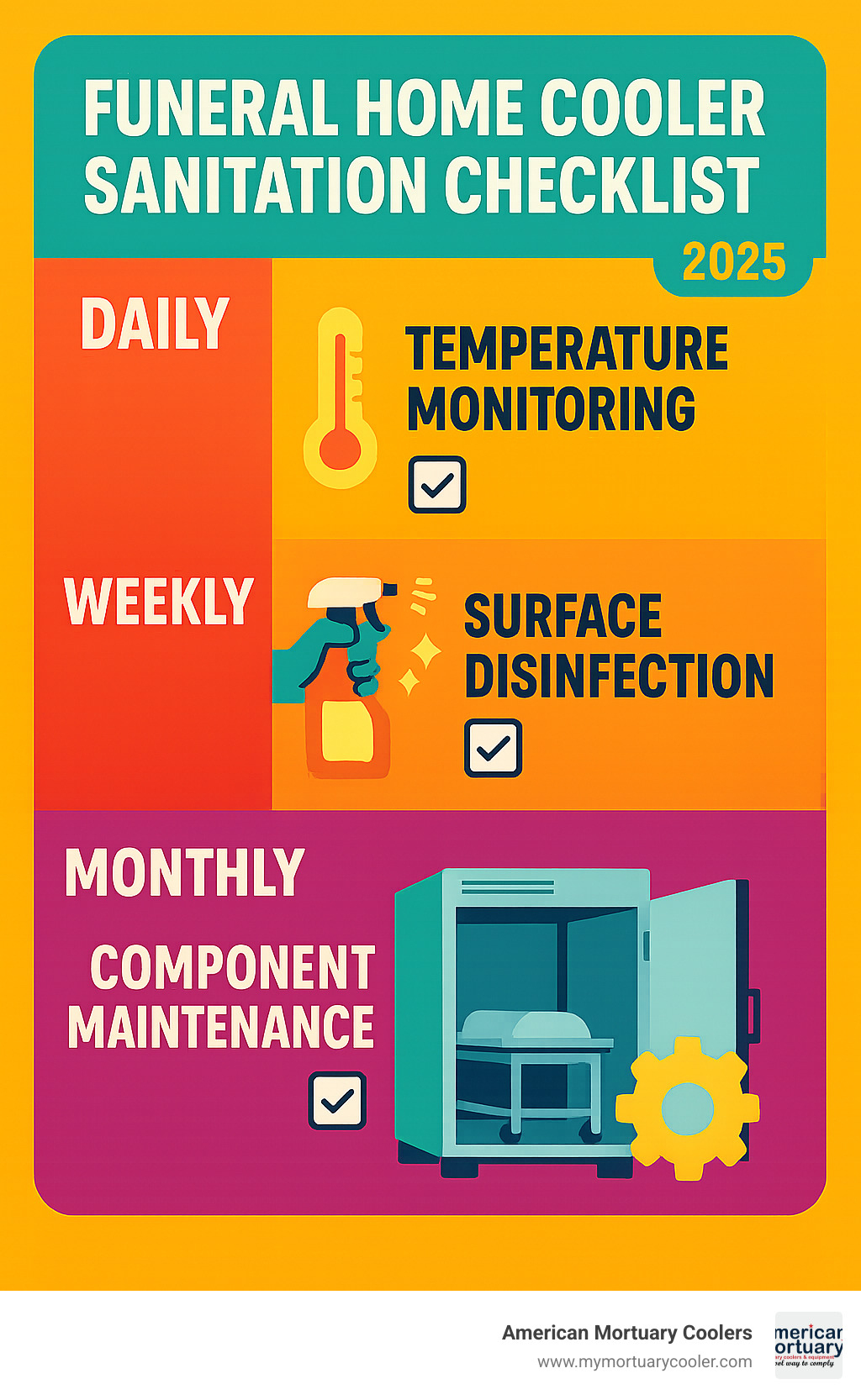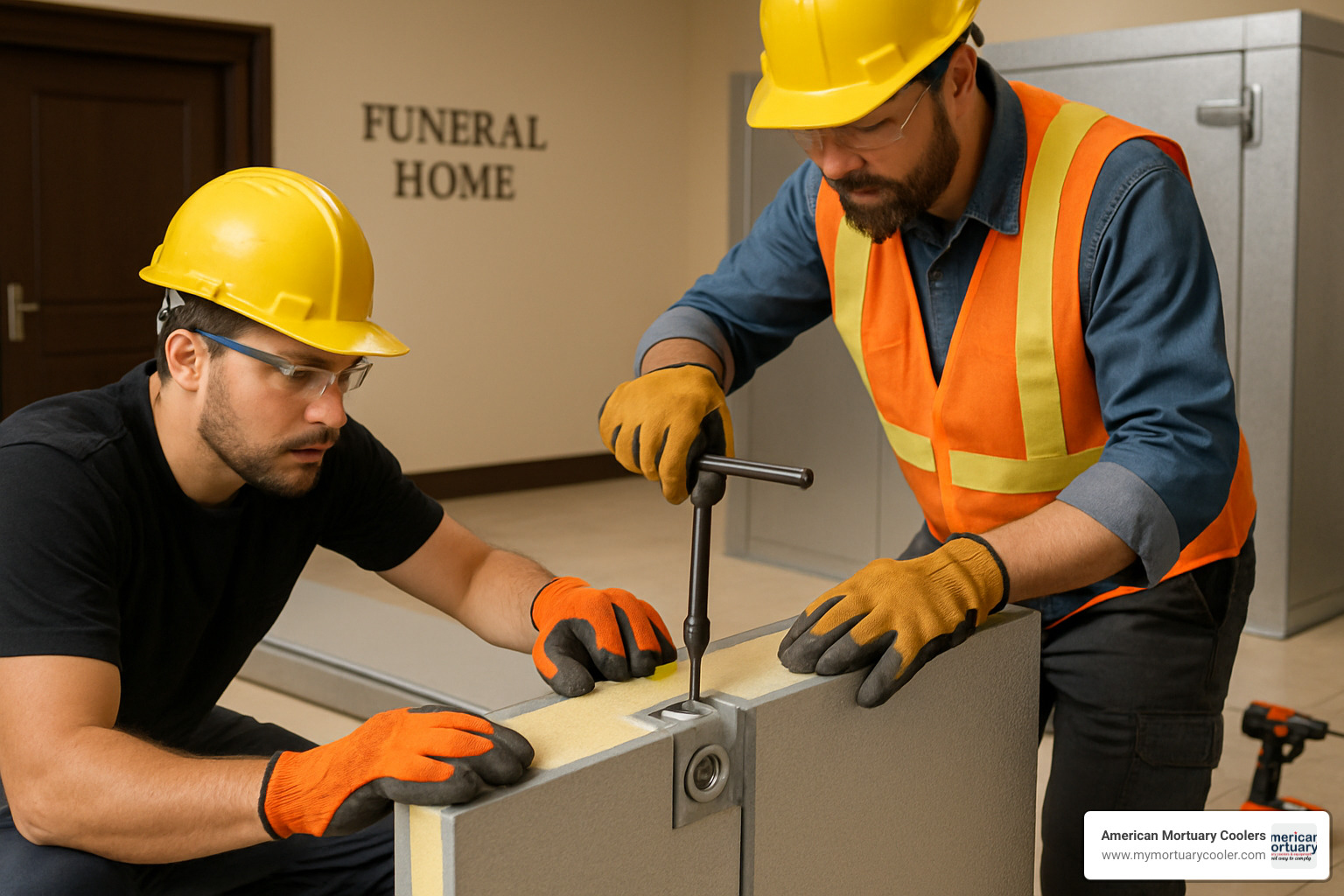
A Comprehensive Guide to Choosing the Right Funeral Home Cooler
Why Funeral Home Coolers Are Essential for Modern Mortuary Operations
A funeral home cooler is a specialized refrigeration unit that preserves human remains at 2 °C – 4 °C (35.6 °F – 39.2 °F), giving funeral directors the time and flexibility they need to serve grieving families with dignity.
Quick Facts About Funeral Home Coolers:
- Temperature Range: 2 – 4 °C (35.6 – 39.2 °F)
- Capacity Options: 1-body to 12-body units
- Price Range: $5,799 – $33,525
- Power: Standard 110 V outlets
- Warranty: 15 yrs on panels, 5 yrs on mechanical parts
- Licensing Impact: Required for inspection compliance in most U.S. states and throughout Canada
Without reliable refrigeration, funeral homes risk failed inspections, licensing issues, and rushed scheduling that can compromise service quality. Modern coolers solve these problems by maintaining safe temperatures, slowing decomposition, and allowing families to plan services on their own timeline.
Private graveside ceremonies, increased travel needs, and a growing preference for flexible service dates make on-site refrigeration more important than ever. One industry veteran put it simply: having a cooler "is a game changer" because it removes the pressure for immediate embalming and lets directors focus on family care.
I'm Mortuary Cooler, a national-level supplier who has helped hundreds of funeral homes choose compliant, efficient equipment. The goal of this guide is to share that expertise so you can select a cooler that fits your workflow, budget, and regulatory requirements.

Handy Funeral home cooler terms:
What Is a Funeral Home Cooler and What Is Its Primary Purpose?
Think of a funeral home cooler as a guardian of dignity during one of life's most difficult moments. These specialized refrigeration units do far more than just keep things cold - they create a respectful, controlled environment that preserves human remains while giving families the gift of time.
Unlike the refrigerator in your kitchen or even medical units in hospitals, funeral home coolers are purpose-built for this sacred responsibility. They maintain precise temperatures that slow the natural decomposition process without compromising the dignity of those in their care.
But here's what makes these units truly special: they transform how funeral homes can serve grieving families. When you're dealing with loss, the last thing you need is pressure to make rushed decisions. A reliable funeral home cooler removes that pressure entirely.
Primary Function & Benefits
The magic happens in that sweet spot of temporary holding that changes everything for families. Instead of feeling rushed into immediate arrangements, loved ones can take a breath, process their grief, and plan services that truly honor their departed family member.
This scheduling flexibility is a game-changer. Maybe the family needs time for relatives to travel from across the country. Perhaps they want a weekend service when more people can attend. Or they simply need a few extra days to work through the overwhelming decisions that come with loss.
One of the most meaningful benefits is embalming reduction. When bodies are properly refrigerated, families often have more choices about embalming - which can mean lower costs and more natural options for those who prefer them. It's about giving people control during a time when so much feels out of their hands.
How Funeral Home Coolers Differ From Medical & Commercial Units
A funeral home cooler operates in a very specific temperature range of 2-4°C (35.6-39.2°F). This isn't arbitrary - it's the sweet spot that slows decomposition effectively while avoiding the damage that freezing can cause. Medical units might run colder for organ preservation, but that's not what we need here.
The shelving style tells the whole story about purpose-built design. These aren't just shelves - they're carefully engineered platforms that hold body trays with dignity and stability. Most units accommodate two to four bodies per shelf, each resting flat and secure.
What you can't see is just as important as what you can. The sanitation coatings and seamless interior construction eliminate every crack and crevice where bacteria might hide. The airflow design ensures even temperatures throughout the unit without creating drafts that could affect preservation quality.
These thoughtful engineering details - from specialized door seals to heated door jambs - mean your funeral home cooler will work reliably even when your building's temperature fluctuates with the seasons.
Legal & Temperature Requirements in Canada and the United States
Understanding the regulatory landscape for funeral home coolers can feel overwhelming, but the core requirement is surprisingly consistent: maintain proper refrigeration to protect public health and pass inspections. While the legal language varies between jurisdictions, the practical reality is that refrigeration has become essential for funeral home operations.
In Canada, each province and territory sets its own funeral home regulations, creating a patchwork of requirements that all point toward the same goal - sanitary handling of human remains. The United States follows a similar pattern, with state-level regulations that emphasize proper storage conditions and public health protection.
The temperature standard of 2°C to 4°C (35.6°F to 39.2°F) has emerged as the industry benchmark across both countries. This range effectively slows decomposition while preventing freezing damage, giving funeral directors the flexibility they need to serve families with dignity and care.
More info about Canadian compliance
Are Coolers Mandated by Law?
Here's where things get interesting - funeral home coolers exist in a regulatory gray area where explicit mandates are rare, but practical requirements are nearly universal. Most provincial and state regulations don't specifically say "you must have a cooler," but they do require sanitary conditions and proper storage.
Provincial health authorities in Canada focus on three critical areas: protecting public health from any risks associated with handling deceased individuals, maintaining professional standards that honor the deceased, and ensuring funeral homes meet licensing requirements through regular inspections.
The consequences of inadequate refrigeration tell the real story. Funeral homes without proper cooling systems face licensing issues, failed health inspections, and potential closure. As industry research clearly states, "lack of refrigeration will cause a funeral home to fail inspection." This makes refrigeration practically mandatory, regardless of whether the law explicitly requires it.
State regulations in the United States follow similar patterns, with implicit requirements that become crystal clear during inspection time. No funeral director wants to explain to grieving families why services must be rushed due to inadequate preservation capabilities.
Temperature Monitoring & Record-Keeping
Maintaining consistent temperatures isn't just about equipment - it's about documentation and accountability. Modern funeral home coolers come equipped with digital controllers that provide precise temperature monitoring, and many include remote alarm systems that alert staff immediately if temperatures fluctuate.
Temperature logs serve as your first line of defense during inspections. These records demonstrate your commitment to proper preservation and help identify potential equipment issues before they become serious problems. Digital thermometers with data logging capabilities make this process more reliable and less labor-intensive than manual monitoring.
Remote alarm systems have become increasingly popular, allowing funeral directors to monitor their coolers even when they're not on-site. These systems can send alerts via phone or email, providing peace of mind and ensuring rapid response to any temperature issues.
Scientific research on cold-storage safety
Record-keeping requirements vary by jurisdiction, but maintaining detailed temperature logs is considered a best practice everywhere. These logs not only satisfy regulatory requirements but also help you track equipment performance and plan for maintenance needs.
Types, Sizes & Customization Options for Funeral Home Coolers
Choosing the right funeral home cooler is like finding the perfect fit for your facility's unique needs. Every funeral home operates differently, and we've designed our coolers to match that diversity. Whether you're working with a compact space or managing high-volume operations, there's a configuration that will work for your situation.
Our roll-in units are perfect for facilities that use wheeled stretchers throughout their operations. These units make transfers smooth and reduce the physical strain on your staff. Upright models with multiple shelves maximize your storage capacity while keeping a smaller footprint, making them ideal for most funeral homes.
When space is tight, side-loading configurations can be a game-changer. They allow you to access bodies from the side rather than pulling them straight out, which can make all the difference in a cramped prep room. For larger operations, walk-in coolers provide the ultimate in capacity and accessibility.
The capacity range starts with our single-body units at $5,799 - perfect for smaller funeral homes or as backup storage. Our most popular sizes are the 2-body, 3-body, and 4-body units that handle the daily needs of most funeral operations. When you need more capacity, we offer 6-body and 8-body configurations, plus walk-in options for high-volume facilities. Our largest 12-body upright coolers are priced at $19,799.

For facilities that prioritize ease of use, our telescoping slide rails (available on 8-body units for $33,525) make a huge difference. These rails extend smoothly, reducing the effort needed to load and unload bodies. It's one of those features that your staff will appreciate every single day.
Our extra-wide (XL) configurations accommodate larger individuals with dignity and respect. The modular panel construction is particularly smart for growing businesses - you can expand your cooler capacity as your needs change, rather than starting over with entirely new equipment.
Capacity Planning & Space Considerations
Getting the capacity right from the start saves headaches and money down the road. You'll want to look at your busiest periods - often winter months or flu seasons - rather than just your average volume. A standard 4-body upright cooler measures approximately 94.5" deep x 44" wide x 105.5" tall (including the cooling unit and casters), so make sure you have adequate floor space and ceiling clearance.
Door clearance is something that gets overlooked until installation day. Roll-in coolers need room for stretcher maneuvering, and upright units need space for tray removal. Measure twice, order once - as they say.
Think about your facility's future too. The demographics in your area might be shifting toward an older population, which could increase your volume over time. On the flip side, if cremation rates are rising in your region, you might need less long-term storage but more flexibility in scheduling.
We often recommend going slightly larger than your current needs if the budget allows. It's usually more cost-effective than adding a second unit later, and it gives you breathing room during unexpectedly busy periods.
Popular Custom Upgrades
LED lighting systems are one of our most requested upgrades, and for good reason. They provide better visibility for your staff while using less energy than traditional fluorescent fixtures. The vapor-proof fixtures with exterior switches and pilot lights meet all safety requirements while making daily operations smoother.
Insulated floors might not sound exciting, but they make a real difference in energy efficiency and temperature stability. This upgrade is especially valuable if your cooler sits on a concrete floor or in a basement location where heat transfer can be an issue.
Casters give you flexibility to move units when needed, though you'll want to consider your floor surfaces and door clearances before adding this feature. Temperature alarm systems provide peace of mind through continuous monitoring and can send alerts to staff phones or connect to your facility's alarm system.
Shelving width customization ensures your trays and boards fit perfectly. We offer 23", 27", and 30" widths to match your specific equipment. It's a small detail that makes daily operations much smoother.
More info about mortuary rack systems
Key Features, Energy Efficiency & Sanitation Standards
When you're investing in a funeral home cooler, understanding the engineering behind these specialized units helps you make the right choice for your facility. Modern funeral home coolers are designed as self-contained systems that plug into any standard 110V electrical outlet - no special wiring, no drainage connections, no complicated installation requirements.
This plug-and-play approach means you can have your cooler up and running quickly without major facility modifications. The simplicity is intentional - funeral directors have enough to worry about without dealing with complex equipment installations.
The high-density insulation in quality units meets both EISA 2007 and DOE 2009 energy efficiency standards. These aren't just regulatory checkboxes - they translate to real savings on your electric bill. The closed-cell insulation materials resist moisture absorption, which means they maintain their insulating properties year after year instead of degrading over time like cheaper alternatives.

Antimicrobial surfaces throughout the interior actively fight bacterial growth, making your cleaning routine more effective and helping maintain the sanitary environment required by health inspectors. The seamless fiberglass construction eliminates those troublesome corners and joints where contaminants love to hide.
Ensuring Biohazard Control & Easy Cleaning
The vapor-proof lighting systems in professional-grade coolers aren't just about seeing clearly - they're about safety. These UL-approved fixtures keep moisture out while providing excellent visibility. The exterior switches mean you can turn lights on and off without opening the unit, which helps maintain temperature stability and reduces your exposure to potential hazards.
Coved base construction might sound like technical jargon, but it's actually a simple concept that makes a big difference. Instead of sharp 90-degree corners where debris can collect, the curved transition from walls to floor makes thorough cleaning much easier. Combined with removable trays and shelving, you can access every surface for complete sanitation.

Your disinfection protocols should follow manufacturer guidelines and use approved biohazard cleaning agents. Regular training for staff on proper cleaning techniques isn't just about compliance - it's about protecting your team and ensuring your equipment serves you reliably for years.
Reliability & Remote Monitoring Technology
Low-ambient controls are one of those features you hope you'll never need, but you'll be grateful to have. These systems keep your cooler running reliably even when the building gets cold in winter or if your HVAC system fails. They automatically adjust the refrigeration cycle to maintain that critical 2-4°C temperature range regardless of what's happening outside the unit.
For facilities looking at custom solutions, CoolBot retrofits offer an interesting alternative. One funeral director successfully converted a walk-in cooler using this technology, creating an 8'x12' unit with 25-body capacity for around $5,000. While not suitable for every situation, these systems demonstrate the flexibility available in modern refrigeration technology.
WiFi-enabled monitoring systems bring your cooler into the digital age. Real-time temperature alerts sent directly to your phone mean you'll know immediately if something goes wrong, even when you're not at the facility. The 30-day temperature history logs provide valuable documentation for inspections and help identify potential issues before they become emergencies.
Redundancy planning is something we always discuss with clients. Having backup systems or service agreements in place protects your operation and your reputation when equipment needs maintenance or repair.
More info about dependable refrigeration
Costs, Installation & Maintenance Best Practices
Investing in a funeral home cooler requires careful budget planning, as prices range from $5,799 for a basic 1-body roll-in unit to $33,525 for premium 8-body models with telescoping slide rails. Most funeral homes find the sweet spot in our 4-body upright cooler at $9,199, which handles typical operational needs without breaking the budget.
Beyond the unit cost, you'll need to factor in freight delivery charges and site preparation expenses. We can ship units either fully assembled or as unassembled panels - assembled units require forklift access or loading dock facilities, while panel shipments allow hand-unloading but may include additional shipping fees depending on your location.

The good news? Our warranty coverage protects your investment with 15 years on panels and doors and 5 years on all mechanical components, plus 2 years of parts and labor coverage. These aren't just numbers on paper - they reflect our confidence in building equipment that lasts decades, not years.
Operating costs remain surprisingly low thanks to energy-efficient designs that meet DOE 2009 standards. Most funeral homes report monthly electrical costs between $50-150 depending on usage patterns and local utility rates.
Installation Checklist & Timeline
The installation process is refreshingly straightforward compared to other commercial equipment. Most units run on standard 110V outlets - no special electrical systems required. Larger units may need 208-230V connections, but we'll specify exact requirements when you place your order.
Your installation site needs level flooring capable of supporting the unit's weight plus full capacity. Concrete floors work perfectly, though some funeral homes add insulated floor panels for improved energy efficiency, especially in basement installations.
Our cam-lock panel system makes assembly surprisingly simple. Two people can typically complete installation in 2-4 hours using basic tools. The panels fit together like precision puzzle pieces, and our detailed instructions walk you through each step.
Start-up testing includes temperature verification, alarm system checks, and basic operation training. We recommend having your maintenance team present during installation to learn proper operation procedures and ask questions while our technicians are on-site.
Ongoing Maintenance & Inspection Readiness
Temperature logging keeps you inspection-ready and ensures optimal preservation conditions. Digital controllers with data logging make this process automatic - no more manual temperature charts or missed readings. Most jurisdictions require daily temperature documentation, and digital systems provide more accurate records than manual methods.
Condenser cleaning represents your most important maintenance task. Dusty environments require monthly attention, while normal conditions need quarterly cleaning. A clean condenser runs efficiently and prevents costly breakdowns that could compromise your entire operation.
Gasket inspection prevents the small problems that become big headaches. Check door seals monthly for cracks or wear - damaged gaskets allow warm air infiltration that forces the system to work harder and compromises temperature control. Replacement gaskets are readily available and typically cost under $200.
Professional servicing becomes necessary when you notice temperature fluctuations, unusual noises, or increased energy consumption. Many funeral homes establish relationships with local commercial refrigeration technicians who understand mortuary equipment requirements.
The key to passing inspections? Consistent documentation and proactive maintenance. Inspectors appreciate well-maintained equipment with complete records, and your families deserve the reliability that comes from proper care of your cooling systems.
More info about choosing body coolers
Frequently Asked Questions about Funeral Home Coolers
When funeral directors are exploring refrigeration options, they often have practical questions about availability, capacity, and service terms. Let me address the most common concerns we hear from funeral home operators across the country.
Are portable or rental funeral home coolers available?
Mobile trailer units are available for situations when your primary refrigeration fails or you need temporary expansion. These self-contained units can be parked outside your facility and plugged into standard electrical service, providing immediate relief during equipment failures or facility renovations.
Specialized rental companies like Polar Leasing offer mortuary cooler rentals that serve as lifelines during emergency situations. We've seen funeral homes use these services during mass casualty events, peak demand periods like flu seasons, or when their main cooler needs major repairs.
Portable body boxes offer another flexible solution, particularly for smaller operations. These wheeled units plug into standard outlets and can be repositioned as needed. They're especially valuable for funeral homes with seasonal volume changes or those operating in multiple locations.
For disaster response situations, these portable options become essential. Hurricane seasons, natural disasters, or other emergency events can overwhelm local facilities, and having access to mobile refrigeration can make the difference between serving families with dignity or facing impossible situations.
How many bodies can a standard funeral home cooler hold?
The capacity question depends on your specific funeral home cooler configuration and operational needs. Our most popular 4-body upright cooler accommodates four adult bodies on separate shelving levels, but practical capacity often differs from maximum rated capacity.
During busy periods when you need frequent access, a 4-body cooler may effectively hold three bodies to maintain workflow efficiency. The 12-body walk-in units provide more flexibility for high-volume operations, allowing staff to move around inside without constantly opening and closing doors.
Expansion modules give you room to grow without replacing your entire system. Our modular panel construction means you can start with a smaller unit and expand later, or even reconfigure the space as your needs change. Some funeral homes connect multiple units or use modular systems that adapt over time.
Consider your peak demand periods when planning capacity. Holiday seasons, flu outbreaks, or local demographics can create temporary surges that require more storage than your typical daily volume.
What warranty and service terms should I expect?
Industry-standard warranties reflect the serious nature of mortuary refrigeration - this equipment can't fail when families are counting on you. We provide 15 years coverage on panels and doors because modern insulated construction is built to last decades, not just years.
Mechanical components including compressors, fans, and controls carry 5-year warranties, while comprehensive parts and labor coverage extends for 2 years. These timeframes recognize that refrigeration systems work hard around the clock and need robust protection.
At American Mortuary Coolers, we maintain parts inventory and service networks to ensure rapid response when you need help. Factory-trained technicians understand the unique requirements of mortuary refrigeration and can diagnose problems quickly.
Extended warranty options make sense for funeral homes where equipment failure could severely impact operations. Consider service contracts that include preventive maintenance, priority response, and even loaner equipment during major repairs. The peace of mind is worth the investment when you're serving grieving families who can't wait for repairs.
Conclusion
Choosing the right funeral home cooler is one of the most important equipment decisions you'll make for your facility. The right refrigeration system transforms how you serve families, giving you the flexibility to accommodate their needs while maintaining the highest standards of dignity and care.
At American Mortuary Coolers, we understand that every funeral home is unique. That's why we specialize in crafting custom solutions custom to your specific needs, whether you're operating a small family funeral home or managing a high-volume facility. Based in Tennessee, we deliver our durable funeral home coolers across all 48 contiguous states, backed by comprehensive warranties and reliable service support.
The path to selecting your ideal cooler involves several key considerations. First, assess your facility's typical volume and peak capacity needs - understanding your busiest periods helps determine whether a 2-body unit or larger configuration serves you best. Next, ensure your space and electrical infrastructure can accommodate your chosen unit - most of our coolers need only standard 110V power, but planning for adequate clearance and access is crucial.
Feature selection should focus on operational efficiency - options like LED lighting, temperature alarms, and telescoping rails can significantly improve daily operations. Finally, choose a manufacturer with proven reliability - equipment failure in this industry isn't just inconvenient, it can compromise your ability to serve families during their most difficult times.
Our experienced team has helped hundreds of funeral directors steer these decisions. We know the regulatory landscape, understand the operational challenges you face, and recognize how the right refrigeration system can be "literally a game changer" for your business. Whether you need a compact roll-in cooler for tight spaces or a custom walk-in unit for expanded capacity, we'll work with you to find the perfect solution.
We invite you to reach out for a personalized consultation. Our commitment to quality manufacturing, custom solutions, and exceptional customer service means you'll receive equipment that serves your community's needs reliably for years to come. Let us help you find the funeral home cooler that gives you the operational flexibility and peace of mind you deserve.



